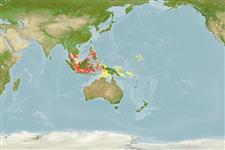Klassifizierung / Names
Namen | Synonyme | Catalog of Fishes(Gattung, Arten) | ITIS | CoL | WoRMS | Cloffa
>
Ovalentaria/misc (Various families in series Ovalentaria) >
Pseudochromidae (Dottybacks) > Pseudochrominae
Etymology: Manonichthys: Name is a combination of Greek manon which is a kind of sponge, and ichthys for fish, referring to the sponge-dwelling behaviour of the species under this genus.; alleni: Named for Gerald Allen..
More on author: Gill.
Environment: milieu / climate zone / depth range / distribution range
Ökologie
seewasser riff-verbunden; tiefenbereich 2 - 40 m (Ref. 81967). Tropical
Western Pacific: Indonesia, Malaysia and the Philippines.
Size / Gewicht / Alter
Maturity: Lm ? range ? - ? cm
Max length : 5.1 cm SL Männchen/unbestimmt; (Ref. 81967)
Kurzbeschreibung
Morphologie | Morphometrie
Rückenflossenstacheln (insgesamt): 3; Rückenflossenweichstrahlen (insgesamt): 28-29; Afterflossenstacheln 3; Afterflossenweichstrahlen: 14 - 15; Wirbelzahl: 26. This species is distinct in having the following characters: hyaline pectoral fins, some ctenoid scales on cheek and operculum; rounded to truncate caudal fin; 17-22 predorsal scales, extending anteriorly to point ranging from anterior AIO pores to posterior nasal pores; dark (more or less) vertical bars extending from above and below eye absent (Ref. 81967).
Solitary and cryptic. Inhabits caves and under ledges of coastal fringing reefs (Ref 90102). This species has been observed to inhabit the tubular sponge Callyspongia aerizusa (Ref. 93553).
Life cycle and mating behavior
Geschlechtsreife | Fortpflanzung | Ablaichen | Eier | Fecundity | Larven
Gill, A.C., 2004. Revision of the Indo-Pacific dottyback fish subfamily Pseudochrominae (Perciformes: Pseudochromidae). Smith. Monogr. (1):1-213. (Ref. 81967)
IUCN Rote Liste Status (Ref. 130435)
Bedrohung für Menschen
Harmless
Nutzung durch Menschen
Mehr Information
NamenSynonymeMetabolismusRäuberÖkotoxikologieFortpflanzungGeschlechtsreifeAblaichenSpawning aggregationFecundityEierEientwicklung
Alter/GrößeWachstumLänge-GewichtLänge-LängeLängenhäufigkeitenMorphometrieMorphologieLarvenLarven Pop.Dyn.RekrutierungDichteBRUVS
ReferenzenAquakulturAquakultur ProfilZuchtlinienGenetikElectrophoresesVererbbarkeitKrankheitenVerarbeitungNutrientsMass conversion
PartnerBilderStamps, Coins Misc.LauteCiguateraGeschwindigkeitSchwimmstilKiemenoberflächeOtolithsGehirngrößeSehfähigkeit
Tools
Zusatzinformationen
Download XML
Internet Quellen
Estimates based on models
Preferred temperature (Ref.
123201): 28.1 - 29, mean 28.7 °C (based on 128 cells).
Phylogenetic diversity index (Ref.
82804): PD
50 = 0.5078 [Uniqueness, from 0.5 = low to 2.0 = high].
Bayesian length-weight: a=0.01995 (0.00906 - 0.04395), b=3.01 (2.83 - 3.19), in cm total length, based on all LWR estimates for this body shape (Ref.
93245).
Trophic level (Ref.
69278): 3.4 ±0.5 se; based on size and trophs of closest relatives
Fishing Vulnerability (Ref.
59153): Low vulnerability (10 of 100).
